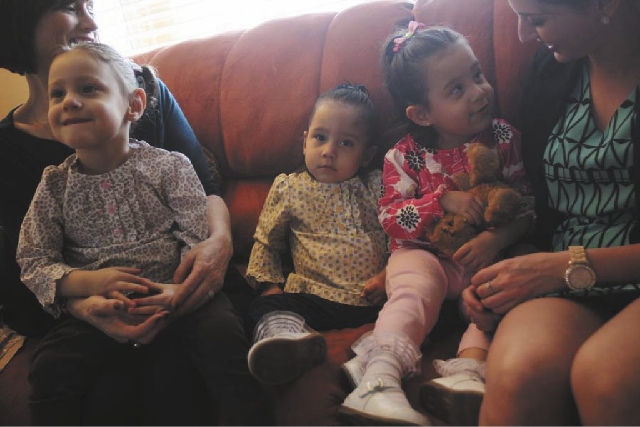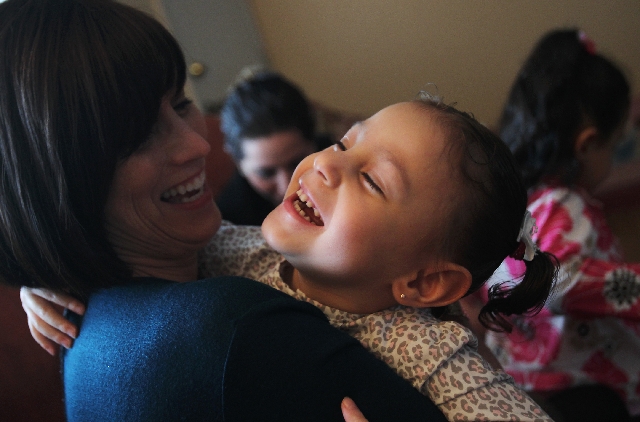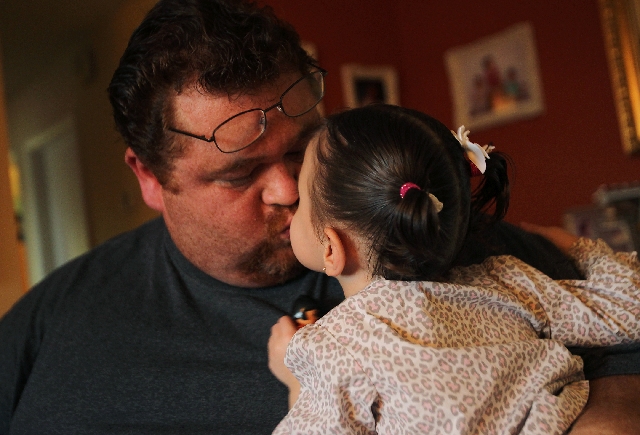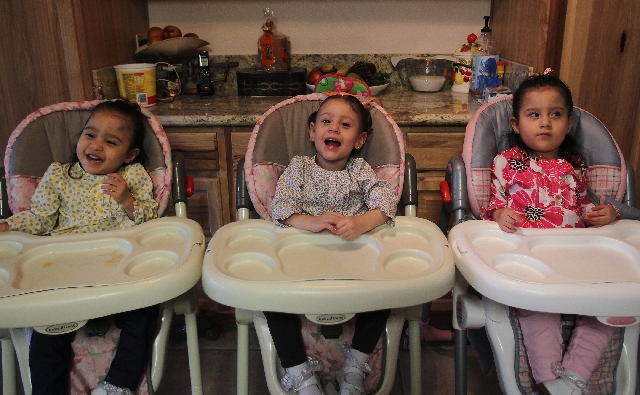Easter Seals helps family with premature girls’ physical disabilities




Omar Lazo says he’ll never quite sort out the experience. He relives it in his dreams time and time again, but always through a broken lens.
The 49-year-old supervisor at City Lites Las Vegas knows that if you skip a step in a process –– whether it’s when creating casino signage or trying to ensure a pregnancy moves forward safely –– you shouldn’t be surprised if things don’t go smoothly.
Just how dangerous it can be was brought home to him when it involved his wife and kids.
He remembers sitting in a physician’s office with his wife and deciding to skip her pregnancy checkup and scan of her belly after learning administrators with his health insurance balked at paying for ultrasounds every two weeks as the doctor had ordered.
Delia Lazo, then 46, was about 23 weeks along with four fetuses. The doctor said — without examining her — that everything was going well with what could be a complicated pregnancy and that there shouldn’t be a danger in skipping just this one checkup.
In the confusion over the insurance question, Delia Lazo didn’t tell the practitioner that she had developed an itch, which, unknown to her, is sometimes a sign of liver problems during pregnancy.
When Lazo’s wife returned to the doctor at 26 weeks, she was itching terribly and Omar Lazo always recalls with a sinking heart that the doctor found his wife’s liver and kidneys were failing –– an immediate C-section was necessary to save her life.
“I let the insurance problem get in the way,” Lazo said, choking up. “I should’ve paid the doctor the three or four hundred (dollars) for the consultation or said bill me. Why didn’t I? And though he said everything would probably be OK, I wish the doctor insisted Delia have the checkup he recommended. You don’t skip that. I hope he learned a lesson. I know I have. You must speak up.
“I think about it all the time. I should have called the doctor when my wife was itching so bad. If the doctor caught the problem early and gave her medicine, we might not be in the situation we’re in –– that’s what the doctor said.”
Today, Omar and Delia Lazo are the proud parents of three 2½-year-old girls, Delia, Sandra and Sophia. Their fourth child, Stephanie, died before she left Summerlin Hospital. But the Lazos are dealing with children with developmental delay challenges and one case of cerebral palsy, all brought because they were born 14 weeks premature.
It is largely because of Easter Seals Nevada that Omar and Delia Lazo have hope their girls can live happy and productive lives.
HELP FROM EASTER SEALS
Easter Seals Nevada, which opened in 1950, is one of the agencies that receives federal and state funding in addition to donations to deliver early intervention programs to families whose children have special needs. It has an annual budget of $7.2 million and served more than 8,000 Nevadans living with disabilities last year.
Occupational and physical therapists, in addition to behavioral, feeding and speech clinicians, regularly work with the Lazo children at no cost to the family and teach Omar and Delia how to do it as well. At age 3, the school district takes over therapies.
“The strides the girls have made have been amazing,” said Omar Lazo, who speaks for the family because his largely Spanish-speaking wife is uncomfortable speaking English. “I see my kids having a good future.”
So does Dr. Keith Blum, a neurosurgeon consulted shortly after the birth of the babies, who each weighed less than 1½ pounds. Two girls, Sandra and Sophia, had bleeding in the brain, relatively common among premature babies, that stopped by itself.
“I didn’t have to do any surgery,” Blum said. “They (the parents) don’t know how lucky they are. The children are going to have a good quality of life with some mild impairments.”
As she sat in the Lazo home recently and cuddled one child after another, Monica Galindo, a developmental specialist for Easter Seals, talked about some of the impairments:
“Sophia needs help with language and also with feeding. She’s not chewing food well. So most of the time it is blended. The feeding therapists might give her a celery stick, something hard to bite, and then model an exaggerated chew for her to imitate. She only knows 10 or 15 words but she should know more than 50 and be putting two or more words together. The therapist will give a name to something and then put it out of reach so she’ll have to ask for it. …
“Delia’s not walking alone and needs a physical therapist. The therapist will have like a walker and encourage her to go to the other side of the room. She still has a feeding tube that we hope gets out pretty soon. She only takes liquids that way –– she chokes when she gets liquids by mouth. …
“Sandra’s been diagnosed with mild cerebral palsy. She’s walking, but her balance isn’t so great –– she’s wobbly –– so the physical therapists put her on uneven surfaces to build her up and even have her climbing over pillows to make her legs stronger. She also has an occupational therapist working on her fine motor skills. They’ll have her pulling on things, stacking blocks, picking up tiny objects off the floor. She’s also not talking at this point. So they have her gesturing and pointing. Like Delia, she’s got a feeding tube.”
What has happened in the Lazo family is almost a miracle, said Easter Seals CEO Brian Patchett. “It makes you feel so good when these children become more and more independent.”
Standing in the bedroom with three baby beds where his three children sleep, occasionally through the night, Omar Lazo had a difficult time holding back the tears as he explained that his neighbors in northwest Las Vegas tore up the carpet, put in wood floors and painted the house while the family was at the hospital.
PLANNING A FAMILY
Omar Lazo described reconnecting with Delia, a friend from childhood, about six years ago.
They both had been married unsuccessfully to spouses who didn’t want children.
After dating briefly, they married in 2008. When she didn’t become pregnant naturally, they considered fertility treatments.
“We were concerned at age 46 she might be too old but they said after a physical at a fertility center that she was in good shape,” he said. “They said it could be a difficult pregnancy but if she took good care of herself it could work out fine.”
Fertility treatments in Las Vegas didn’t work. They did — fourfold — in Mexico. The doctor there worried about pregnancy complications that often accompany multiple births and urged them to let him “get rid of two.”
The Lazos couldn’t do it.
“We just didn’t feel right about that,” Omar Lazo said. “It was like after all this time God gave us four lives he wanted us to take care of.”
Still, Lazo appreciated the doctor’s concerns and found a specialist in Las Vegas who said Delia’s physical condition could allow her to safely carry the four fetuses, but that he still wanted her checked every two weeks.
“Everything was going great for Delia for a while and then that one appointment got skipped,” Lazo said. He conceded some members of their extended family feel he and his wife made a mistake with the multiple pregnancy, particularly at Delia’s age.
Lisa Pacheco, director of maternal services at University Medical Center, said a woman at any age carrying multiples is at greater risk of pregnancy complications, including very premature births.
While a successful pregnancy is based more on a woman’s health than age, Pacheco said, it’s important to remember the strain of four extra lives on a woman’s heart, kidneys and liver. “It’s a very definite risk,” she said.
Studies do show that there are much greater risks of complications, even in a single pregnancy, as a woman ages. For instance, the rate of any chromosomal disorder at age 20 is 1 in 526 births. At age 45, it’s 1 in 21 births. The risk of a woman having a child with Down syndrome is 1 in 1,250 births at age 25, and 1 in 10 births at age 49.
OLDER MOTHERS
Despite those statistics, many women have successful pregnancies after age 40.
A government report released last year showed pregnancy rates among women 40 to 44 went up nearly 65 percent from 1990 to 2008 while pregnancy rates among women in their early 20s fell nearly 18 percent over the same time period.
“What it all comes down to is that there has to be great communication between the doctor and patient,” Pacheco said. “If a woman is itchy, her doctor needs to know that. And insurance companies should be doing all they can –– not worrying about the cost of one scan or ultrasound –– to ensure a successful pregnancy. Because if they don’t, they end up paying for it on the back end.”
Lazo said it cost more than $3 million to have his three daughters in ICU at Summerlin Hospital for four months and another $2 million to try to save Stephanie’s life there.
“Fortunately, after my insurance and the hospital worked it out, I only was responsible for $6,000,” he said.
What concerns Lazo now is being in condition to care for his daughters long term.
He’s 5 feet, 6 inches tall and weighs 340 pounds with high blood pressure and diabetes. He said he’s a considering an operation to help him control his weight.
Pacheco said she believes that with so many parents having children later in life that it won’t be long before Americans must deal with an important question.
When a society has many new parents at 46 or 50 with children who still will have to have needs addressed in their 20s and 30s –– a time when the aging parents need help themselves –– what happens then?
Contact reporter Paul Harasim at pharasim@
reviewjournal.com or 702-387-2908.
WALK WITH ME
What: Easter Seals Nevada’s fundraising event
When: 9 a.m. Saturday
Where: W. Wayne Bunker Family Park, West Alexander Road and North Tenaya Way
Details: Comedian George Wallace will host and dance crew Jabbawockeez will serve as grand marshals. There will be an Easter egg hunt, food and a performance by the School of Rock.
To register as a team for the walk and to collect pledges that will go to benefit those in Southern Nevada who need support this Easter, go to walkwithme.org/lasvegas.












